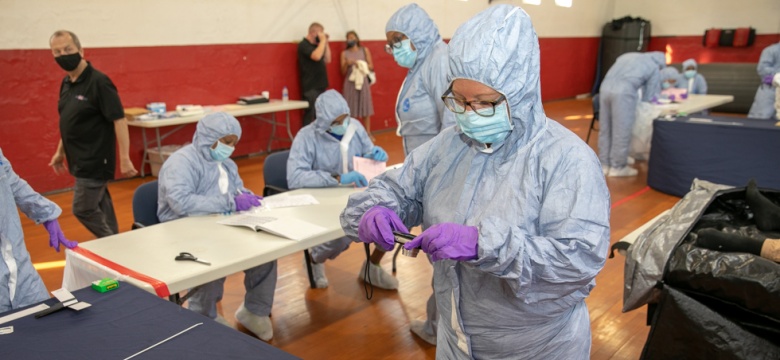
Mr. Speaker, I rise this morning to inform this Honourable House that during the week of 30th August 2021, a number of Bermuda agencies received training in Disaster Victim identification known as DVI.
Mr. Speaker, as a direct result of the Air Crash Incident Training conducted in January 2019, a gap was realized that Bermuda and all the other Overseas Territories have in Disaster Victim Identification. To assist, the National Disaster Coordinator approached the Foreign Commonwealth and Development Office, with an application for this DVI training to be delivered across the OT’s.
Mr. Speaker, The DVI process is an internationally recognized sequence of activities that has been developed over several years. It has been tested in large scale disasters in many regions across the world and has proven to be a reliable method by which victim data in the form of post-mortem material can be matched against missing person data. The aim of this matching process is to positively identify human remains.
Mr. Speaker, Bermuda was lucky to receive two instructors, Mr. Howard Way (OBE) and Police Superintendent Pete Sparks (QPM) from the Disaster Victim Identification Team which is part of the National Police Coordination Centre and sits under the National Police Chiefs Council.
Mr. Speaker, They trained 15 students, twelve police officers and three regiment solders who received three full days of training as on the ground practitioners in managing any victims,scene preservation and evidence.
Mr. Speaker, On Friday 3 September, four hours of training was delivered to the various commanders of the agencies that would be involved and staff with specialist roles that are touch points for the scene investigators, this included the Deputy Governor, Permanent Secretary of the Ministry of National Security, Police Commanders, Regiment Commanders, Coast Guard Commander, Fire Commanders, Bermuda Hospital Board, Mass Casualty Team Commander, Interpol Officer, Family Liaison Officers, Property Management Team, Police Training Centre, Police Doctor, Chief Dental Officer, Pathologists, Morgue Manager, Coroners Officer, Crown Counsel, Diplomatic Counsels, Safety and Health Managers, Public Information Officers, Bermuda Red Cross, Bermuda Civil Aviation Authority, Bermuda Airport Authority and Skyport Corporation. The coordination of the training was completed by the Disaster Risk Reduction and Mitigation Team which sits under the Ministry of National Security and the Emergency Measures Organisation.
Mr. Speaker, Over the last 40 years there has unfortunately been many incidents around the world that has involved loss of life on a large scale, these have included air crashes, industrial explosions, fires, acts of terrorism as well as other types of incidents including natural disasters such as hurricanes and tsunamis.
Fortunately these incidents are rare, but this doesn’t mean that we should not be prepared. After each of these incidents an inquiry will take place which has resulted in many recommendations being made.
Mr. Speaker, These inquiries have shaped Disaster Victim Identification into a discipline which follows the recommendations made, and includes:
• The provision to be honest and, as far as possible provide accurate information at all times and at every stage to the families and friends of the victims
• Be respectful to the deceased and to the bereaved
• Have a sympathetic and caring approach
• Act professionally and diligently to avoid mistaken identification
Mr. Speaker, INTERPOL has mandated that one of the most important requirements for victim identification is the application of international standards, which aims to promote a consistent and widely understood approach, especially in multinational DVI operations.
Mr. Speaker, I would like to thank both Howard Way and Pete Sparks for providing their expert advice based on many years of experience, and also to the Foreign and Commonwealth Development Office for sponsoring this training.
Mr. Speaker, The Disaster Risk Reduction and Mitigation Team are now crafting a DVI response plan which will outline Bermuda’s coordinated multi-agency response should an incident ever occur that requires a DVI response in Bermuda.
Mr. Speaker, the work of the DRRM team is important in ensuring that Bermuda is prepared for any large scale disaster. I will continue to update this Honourable House on this work and the important work of all of the Departments and Units within the Ministry of National Security.
Thank you, Mr. Speaker.
